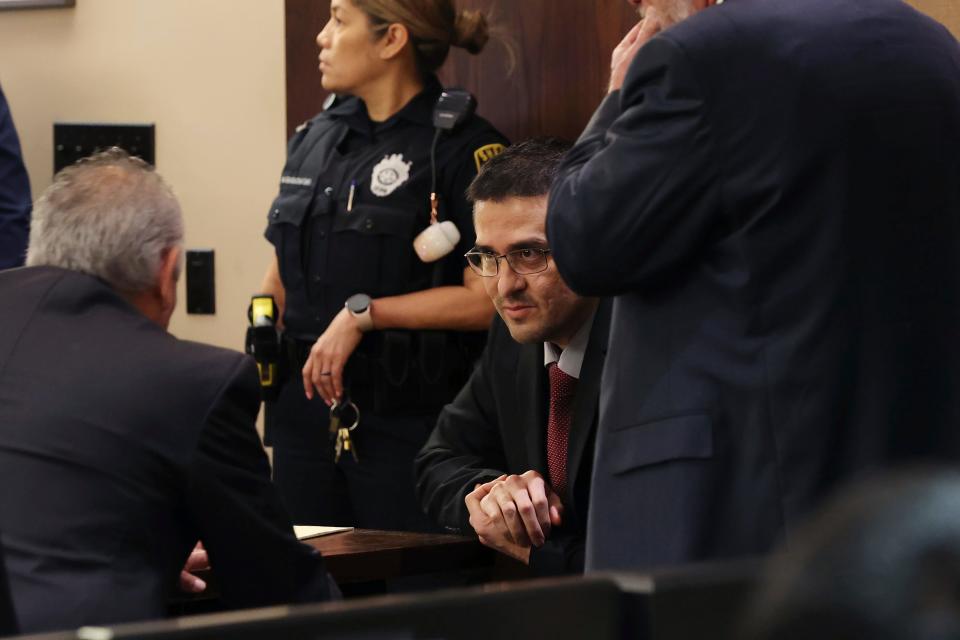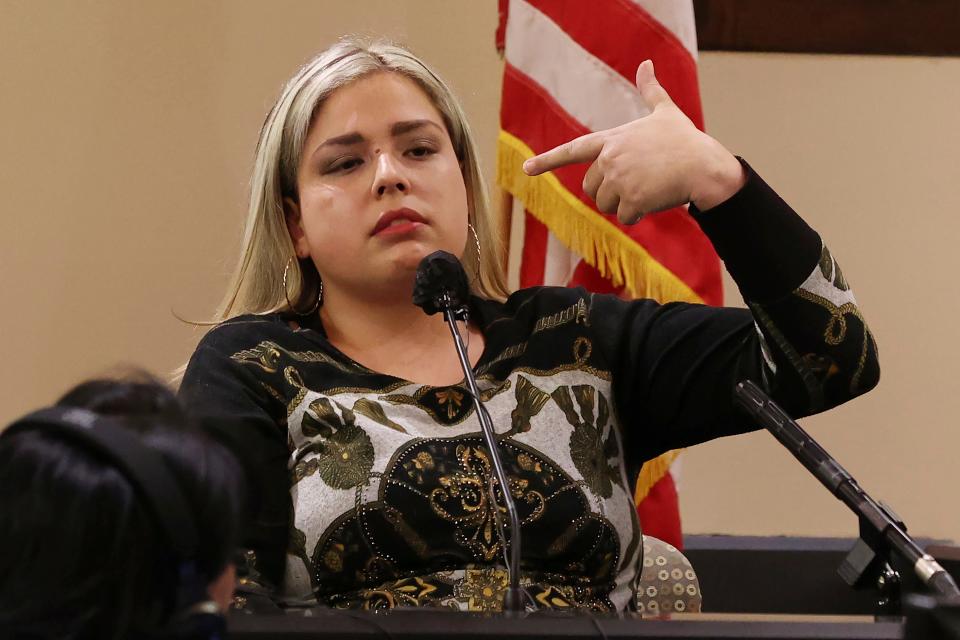Juan David Ortiz found guilty, sentenced to life in Border Patrol serial killing of 4 women
SAN ANTONIO – For 12 days in 2018, Juan David Ortiz, U.S. Border Patrol supervisory agent, picked up women on Laredo's streets, drove them to remote corners of the county and ended their lives with close-range gunshots to the head.
On Wednesday, a jury unanimously found Ortiz guilty of capital murder, ending for now one of the more chilling murder sagas in South Texas history.
It also concluded a trial that was punctuated with courtroom drama, including a doctor who rushed from the witness stand to treat a fainting juror and a revealing jailhouse phone call that further incriminated the defendant.
Ortiz, 39, stood stone-faced as the Webb County Judge Oscar Hale read the verdict, after jury deliberations stretched past 7 p.m. Nearby, more than 20 family members of the victims cried or gasped loudly. Ortiz's mother, seated in the row behind his defense team, collapsed into the arms of a relative, sobbing loudly.

The jury of eight women and four men took five hours to reach their verdict. Ortiz was automatically sentenced to life in prison without parole. He could appeal the decision.
The verdict closed a four-year ordeal in Laredo that included more than a dozen pre-trial hearings and motions, a pandemic that slowed the legal process and an emotional trial that contrasted Ortiz's own videotaped confession with the sobs of victims' families.
After the verdict, one by one, family members of the victims read emotional statements as Ortiz stood a few feet away, facing each person.
"Do you know how much pain you have caused this family?" said Gracie Perez, sister-in-law of Melissa Ramirez, one of the victims. "I hate you for what you did and I could never forgive you, nor do I think God will."
She added: "Monsters like you don’t even deserve to breathe."
From Sept. 3 to 15, 2018, prosecutors said, Ortiz picked up the women – Melissa Ramirez, Claudine Luera, Guiselda Hernandez and Janelle Ortiz – along Laredo’s San Bernardo Avenue, a stretch populated by sex workers and drug pushers. One by one, he drove them out to remote stretches of the county and shot them with his government-issued .40-caliber handgun, leaving their bodies slumped on dirt roads or under overpasses. All women were known to be sex workers who struggled with drug addiction.
"Justice to me would be getting my mother back, and I'll never get my mother back," said Ciara Munguia, 24, Luera's daughter, fighting back tears. "But having him guilty helps bring closure. I could sleep better at night. I could move on with my life."
In Texas: Border Patrol agent's murder trial the latest in string of incidents stirring distrust
Defense: Ortiz was coerced into confession
Ortiz, an Iraq war veteran with the U.S. Navy and a 10-year veteran of Border Patrol, was arrested after he drew his gun on a would-be fifth victim, Erika Pe?a, who fled his pickup truck and alerted police. He had pleaded not guilty to the charges.
Throughout the trial, defense attorneys painted Ortiz as an Iraq war veteran suffering from post-traumatic stress disorder – and taking a cocktail of prescribed medication to treat anxiety and migraines – who was coerced into a lengthy interview with police.
"Look at the guy in front of you, the guy who was there at the time: Broken, PTSD, migraine headaches, insomnia, nightmares," lead defense attorney Joel Perez told jurors Wednesday during closing arguments. Investigators "induced him, they confronted him, they promised him all these things," Perez said. "It was improper inducement."

But District Attorney Isidro Alaniz depicted Perez as a killer agent, saying in a closing statement: "It is terrifying to have the enemy within the ranks of law enforcement."
The 2018 killings were part of a stretch of violence and murder at the hands of Border Patrol Laredo Sector agents that year.
In April 2018, police arrested Ronald Anthony Burgos-Aviles, 33, a Border Patrol agent in Laredo, and charged him with the murders of Grizelda Hernandez, 27, and her 1-year-old son, Dominic. Prosecutors are seeking the death penalty and his trial is tentatively set for January.
A month later, a U.S. Border Patrol agent shot and killed Guatemalan migrant Claudia Patricia Gómez González, 20, after she crossed the U.S.-Mexico border and hid in a vacant lot with other migrants in the nearby enclave of Rio Bravo. The ACLU of Texas in 2020 filed a lawsuit against the agent on behalf of Gómez under the Federal Tort Claims Act for wrongful death, among other charges. The lawsuit was paused later that year when the FBI began investigating the incident.
U.S. Customs and Border Protection, which oversees Border Patrol, has declined to comment on the Ortiz case, saying the agency doesn't comment on pending litigation. Prosecutors have said Ortiz used his personal truck to carry out the murders and was dressed in civilian clothes, though he used his agency-issued handgun and hollow-point government bullets in the slayings.
Immigrant advocates for years have pushed for more transparency in how the agency disciplines its agents for wrongdoing. They point to a number of cross-border shootings by Border Patrol agents over the years as a troubling trend at the agency.
Since January 2010, more than 245 people have died as the result of an encounter with an agent with U.S. Customs and Border Protection, which includes Border Patrol, according to a list compiled by the Southern Border Communities Coalition, an advocacy group.
Survivor's chilling testimony

One of the trial's most dramatic moments came when Pe?a took the stand on the first day and recounted the night Ortiz drove her first to his home in northeast Laredo. That night, she felt a sudden realization Ortiz had murdered her two close friends, Ramirez and Luera. She walked out of the home and vomited in the driveway.
Later, when Ortiz drove her to a nearby convenience store, Pe?a said he grew irritable when she inquired about her slain friends. He drew a gun on her with his left hand and tried to restrain her with his right. Pe?a wriggled out of her blouse and fled to a Texas Department of Public Safety state trooper pumping gas at the station. She was able to identify Ortiz and point out his home to investigators, who arrested him later that night.
"Some way, somehow, I took off running without a shirt," Pe?a from the stand, as she recounted how Ortiz pointed a gun at her face. "I'm crying hysterically."

Dramatic moments at trial
The trial took eight days. The venue had been moved from Laredo, the scene of the crimes, to the Bexar County court system in San Antonio after defense attorneys argued the trial had received too much publicity in Laredo. Testimony was streamed live each day by Court TV and drew the interest of national media outlets.
Families of the victims – dressed in shirts emblazoned with the smiling faces of the four slain women – also attended, at times sobbing through crime scene photos or witness testimony of the killings.
On one day, as Webb County Medical Examiner Corinne Stern testified and explained autopsy photos of the victims, one juror fainted, halting the proceedings. Stern, a licensed medical doctor, left the witness stand to give him aid. The juror regained consciousness and was later dismissed from the trial.
Prosecutors also played all 9? hours of a videotaped interview conducted by investigators on Ortiz after his arrest, where he described how he picked up and shot the women in remote locations. In the video, Ortiz told him how he returned to San Bernardo Avenue – Laredo's red-light district where the women lived and worked – repeatedly, looking for another victim.
"I continued driving on (San Bernardo)," he says in the video. "This is where the monster came out."
On Tuesday, prosecutors also played a jailhouse phone call recording between Ortiz, being held at Webb County Jail at the time, and his wife, Daniela Ortiz. In the call, Ortiz's wife tries to console him as he complains that he's worried about the lengthy confession he gave investigators during his interview.
"I'm very concerned about the statement that was made," Ortiz says in the audio recording.
As the recording unspooled, Ortiz dropped his head on the desk in front of him and quietly wept, dabbing at tears with a tissue. Soon after, the prosecution rested its case. The defense team rested as well without calling any witnesses.
Earlier this year, prosecutors decided not to seek the death penalty, after relatives of the victims said they preferred Ortiz serve the rest of his life in prison.
"Part of me thinks it's worse to spend the rest of your life in prison," said Joey Cantu, 41, Hernandez's brother, who served 23 years in a Texas prison. "I can wake up every day of my life and know he's in there. I know he's going to suffer in there. It's hard."
Follow Jervis on Twitter: @MrRJervis.
This article originally appeared on USA TODAY: Juan David Ortiz trial: Guilty verdict in Laredo Border Patrol murders